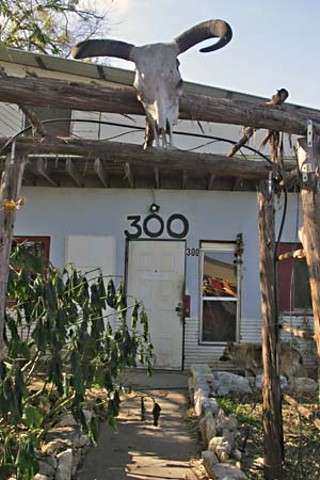No Home for Rhizome ... for Now
Rhizome Collective looks for a new location
By Nora Ankrum, Fri., April 3, 2009

The Rhizome Collective, an Eastside nonprofit organization known as much for its unique warehouse space as for its work on environmental justice and sustainability issues, said goodbye last month to its home at 300 Allen after city code violations forced occupants to vacate. The loss of the warehouse is potentially devastating for the collective and the many other nonprofits that shared its space. Moreover, the loss of the grounds – among other things, fruit trees and gardens, a polyculture pond with edible water plants, constructed wetlands that filter household wastewater for reuse, a room built from straw bales, and an electricity-generating windmill made from spare bicycle parts – is a blow to the whole community.
Much more than just a warehouse, the Rhizome Collective's home has for the last nine years been a busy hub of experimentation in creative methods of sustainable urban living (and a convenient space for countless fundraisers on behalf of local organizations). Out of that work has come the popular Radical Urban Sustainability Training workshop, a weekend crash course in such topics as rainwater harvesting, worm composting, biofuel production, and natural building that attracts eco-minded people from all over the country. The collective's work with bioremediation techniques (using plants, fungi, and bacteria to clean contaminated soils) proved valuable in New Orleans, where Rhizome members were active after Hurricane Katrina. Most notably, Rhizome members used a $200,000 grant from the Environmental Protection Agency to clean up a Montopolis neighborhood brownfield that was once a landfill – an endeavor for which they won a Keep Austin Beautiful award.
Unfortunately, the same DIY spirit that fired Rhizome to its success may have sown the seeds of its demise. After the city received an anonymous complaint Feb. 11, a Solid Waste Services code enforcement investigator inspected the warehouse and discovered "commercial construction performed without required permits" in addition to 14 other violations, many of them relating to plumbing or electrical wiring. According to SWS spokeswoman Jennifer Herber, while some items on the long list might have been easily resolved, the most serious could jeopardize the safety of the building's occupants – hence the order to vacate by March 17.
The organizations that operated out of the warehouse have since been scrambling to find new space. According to collective spokeswoman Laura Merner, Food Not Bombs has temporarily relocated operations to the 21st Street Co-op's kitchen. Bikes Across Borders has found a space where members can work on bikes but not where they can continue community workshops. The Inside Books Project, which donates used books to Texas prisoners, has moved all its books to members' garages. Collective members have been transplanting many of the plants from polyculture projects to community gardens, and Mr. Friend – Rhizome's resident turkey – has moved to the Montopolis brownfield.
Meanwhile, collective members Scott Kellogg and Stacy Pettigrew, who own the property, must figure out what to do with it. They say they can't afford to bring it up to code. They have until April 17 to either sell the property or "pull" the necessary permits, a process that requires hiring contractors to assess what repairs need to be made, then applying for the permits to make them. "The violations reports are very open-ended and vague," said Kellogg. "It's going to be up to the discretion of the individual engineers and plumbers and electricians to determine exactly what work needs to be done. ... It's potentially just a black hole of resources and money." Once they get the permits, Kellogg and Pettigrew would have 60 days to complete the work (or face possible fines of up to $2,000 per violation every day until they do).
Before the code violations were discovered, the couple – who have been living near relatives in New York since their daughter's birth in 2006 and who are expecting a second child in May – had already announced plans to sell the property and had offered the collective the chance to buy it for a below-market price. Collective ownership of the property has long been a goal for Rhizome members, but now that a buyer must be found by April 17, the collective has neither the time to raise the funds nor the resources to take on fixing the property.
"Essentially we're looking at bringing a building that was built in 1952 up to 2009 code," said Kellogg. Because of the modifications the collective has made to the building, its outdated structural elements are no longer grandfathered and must now be brought up to current standards, along with any newer construction. "We didn't know this, otherwise we wouldn't have messed around with that kind of stuff," said Kellogg. "Things like the straw-bale room and the various partitions in the back space – we didn't pull permits for any of that stuff; we just threw them up."
A proudly displayed part of the official Rhizome tour (along with things like a solar-cooking oven and a bicycle-powered blender), the "straw-bale room" even has a window into the wall where you can see and touch the straw from which it's constructed. Now the room must be examined by an engineer to verify that it's structurally sound. If he had to do it over again, said Kellogg, he'd pull all the necessary permits, regardless of the time and cost. "A really important part of this work," he added, "is trying to get recoding to make it so that these more experimental sustainable designs are easy for other people to implement."
After a meeting Monday night, collective members released a statement verifying that they would not be buying the warehouse – but "the Rhizome Collective is not dead," they wrote. Their best option right now, it seems, is to take advantage of the property they do own: the brownfield (which was donated to the collective). While part of the 9.8-acre property lies in a flood plain, a significant portion can still be developed. Plus, it has one big advantage over the warehouse: It's legal. "We actually got a permit to build a composting toilet there," said Kellogg. "It took us four years to get that permit."
If you'd like to donate to the organizations affected by the loss of the Rhizome warehouse: www.insidebooksproject.org, www.bikesacrossborders.org, www.myspace.com/austinfoodnotbombs, www.rhizomecollective.org.
Got something to say on the subject? Send a letter to the editor.








